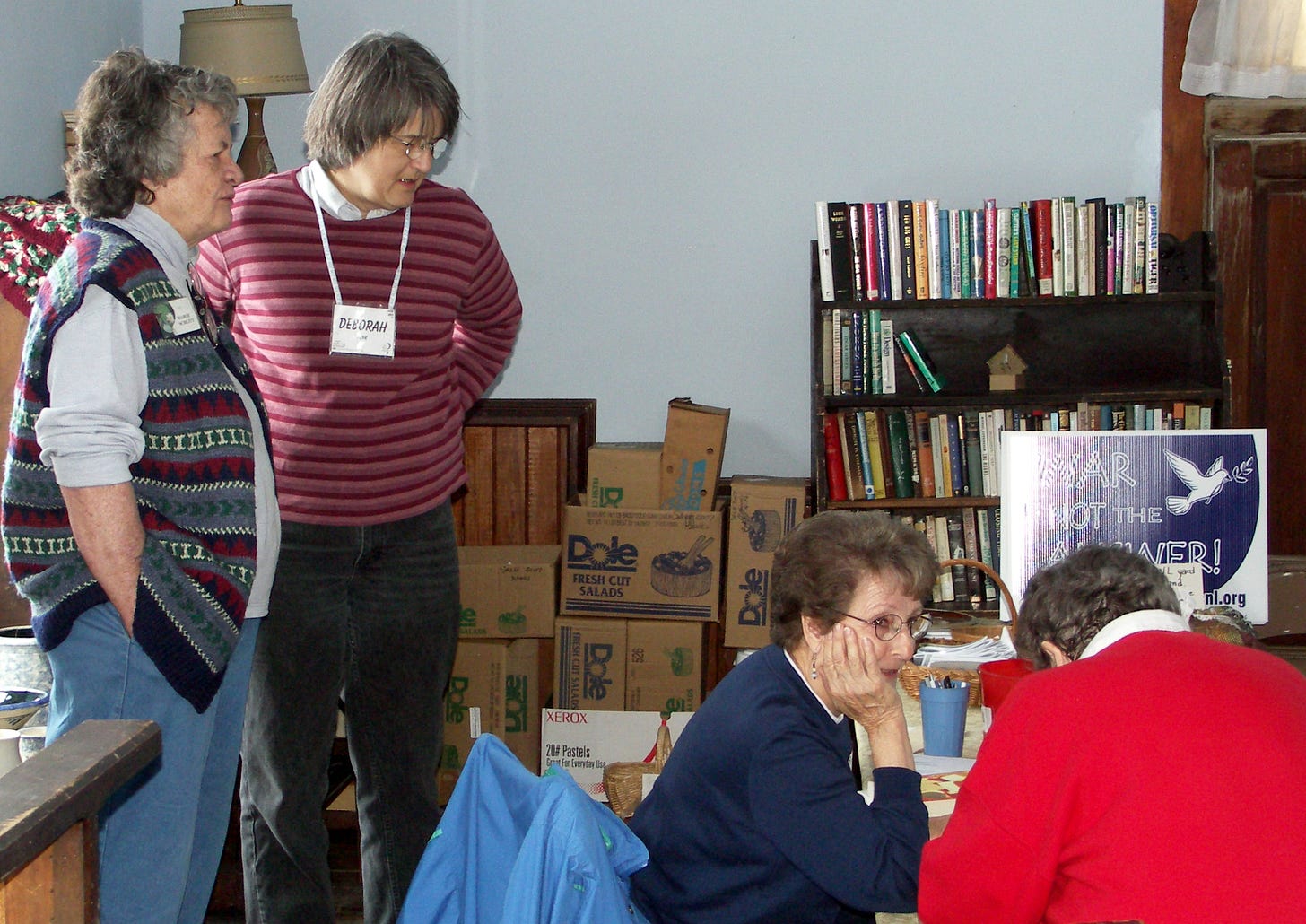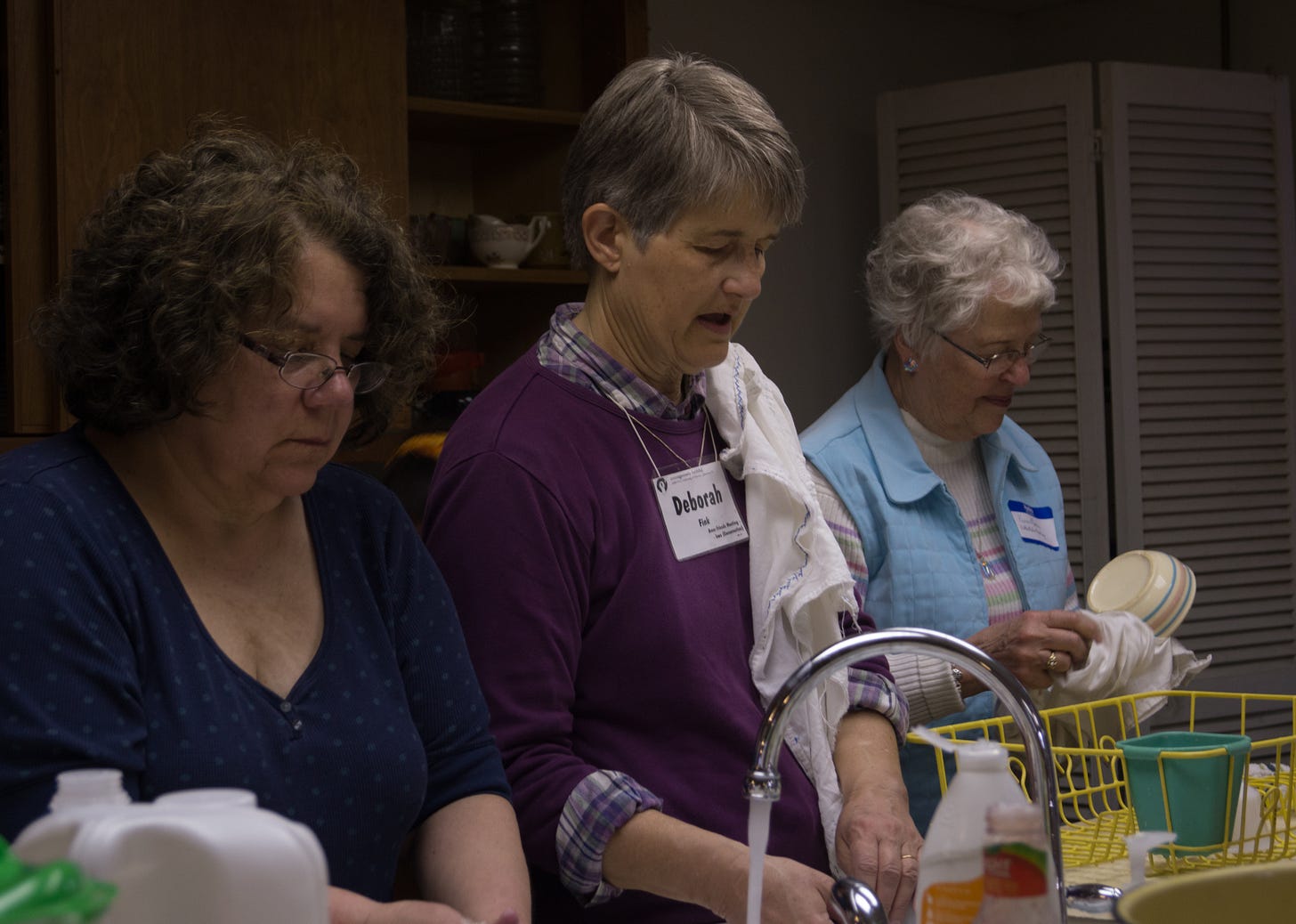A.M. Fink and I wandered into Friends in early 1974. We were ready for a change, but I was the one who was the refugee. My spiritual path has been long, bumpy, and at times traumatic.
I was born in October 1944, shortly after the world entered the atomic era.
Early memories come from the 1940s, when my family lived in Wayne, Nebraska. My family chose the Methodist Church, although neither of their families had been Methodist. My mother, a pianist, was active in all things musical in the church. She accompanied soloists, played in piano-organ duets for church music, and accompanied choir rehearsals. Church was big in the years immediately after World War II. With no pre-school or other organized programs, Sunday School and Bible School were about it for planned activities for me. I sat in church with my parents, often at the front of the church because Mother was on piano. My father, a dentist, went to church reluctantly.
At an early age I had two unforgettable experiences connected to the Methodist Church in Wayne. We moved from Wayne when I was five, so I could have been no older than five when these occurred.
There was a colony of Quonset huts behind our house, living quarters for many veterans attending Wayne State Teachers College on the GI Bill. My brother and I played with Quonset hut kids and went to school with them. On warm evenings Quonset hut folks came outside and sometimes events were held there.
I had a dream set in the Quonset hut area. There was something like a fair going on, lots of people milling around. It was night, but there were street lights, colorful dresses, performers on a makeshift stage. My brother Donnie (two years older) and I were there. Up on the stage went the Methodist preacher, doing a dance and spiel. People were laughing at him, and I felt sorry for him although I also thought he was ridiculous. Then someone laughingly went on the stage and cut off one of his long legs. He was hopping around on one leg, leaning down, and still preaching. I tried to walk away, but the preacher was trying to get me to come back and listen to him. Donnie was with me and warned me that he had my leg, was trying to cut off my leg. I told the preacher to go away and leave me alone. But as I walked away, Donnie told me again that the preacher had my leg and was trying to cut it off. I interpret this dream as Methodist church skepticism and fear of coming under the minister’s sway.
In real life, I remember being in the kids’ room in the basement of the church, when the teacher and my mother told me that there was something called God. God was invisible because he was a spirit, but he was still there. I thought of it as adult hype, some way for them to control and oppress kids. They were serious and not laughing about it at all and they expected me to be serious. I had the feeling that there was something wrong with me because I didn’t get it. Somehow God meant “no messing around.” My stomach hurt. Around then they passed out fig newtons, and I ate one even though I didn’t like it. I got really sick to my stomach and have never eaten another fig newton. I felt that God, like a fig newton, laid an unbearable burden on me that I should have been able to handle but couldn’t. God, fig newtons and happiness could not coexist.
When I was ten my mother made an abrupt turn into Vedanta (Hinduism), which she had come across earlier as a college student in Chicago. Also around this time, she had a nervous breakdown and my father became more alcoholic and distant. From that point I lived in a disturbed, unpredictable home strongly influenced and controlled by a strange version of Hinduism. Through friends I maintained a tangential connection to the Methodist Church, but this was minor from a spiritual standpoint. My mother actively opposed this and my father didn’t care one way or another. I had a sense of being pulled between my mother’s fevered Hinduism and the religious strictures of 1950s rural Nebraska protestantism. I guess you could say I picked Mother; the church had little to offer me.
Mother had me reading Hindu literature, listening to her discourses, and meditating with Om – plus a book of daily Hindu devotions. She interpreted Hindu cosmology on such things as God, reincarnation, birth, death, caste and morals. I got this more than I got Christian cosmology, although I realized that she was nuts and was anxious to get on my own and not have to agree with what she said.
In college I majored in math, but since I went to a liberal arts school I took quite a bit of philosophy, art, history, religion. I read Alan Watts and liked Zen Buddhism, which was refreshingly uncomplicated. Warren Witte came to the college and gave a talk on Quakers and pacifism that stayed with me.
I didn’t go to church at that time or do anything except mechanically read my Hindu devotions every day. One thing I remember reading was – “Do not ever criticize another’s religion. Even the simplest religion leads godward.” I don’t know why I remember that. Mostly I thought the whole thing was a crock of crap. I’m not sure why I kept reading it, maybe to cover the bases, just in case.
A.M. and I married in 1966 in the Lutheran Church. I didn’t go to church with A.M. on Sundays and we were both okay with that. After awhile I started to go to church with him, but it felt icky, even though I tried to like it. When our sons, George and Philip, were born I let them be baptized because A.M. wanted it. George was born in 1968 and Philip in 1969.
What I didn’t like about the church: I didn’t like the creed, which I never said. I also got into a power struggle with the pastor. I was against the war in Vietnam, which I told him. Or A.M. did and got me into it when we were talking. In the sermon the next week, the pastor said something to the effect that people who didn’t support the Vietnam War were naive and thoughtlessly rebellious. He said, “I wish with all my heart that I could say that everything in this country would be perfect if we would just get out of Vietnam, but that isn’t right.” Cheap shot that I couldn’t respond to because he was in front of the church and I wasn’t.
When he asked why I wasn’t joining the church, I told him I was more or less raised as a Hindu and I believed that different religions were different paths to the same end. At the next sermon, he said “It’s fashionable these days to say that all religions are paths to God, but that is wrong.” Another cheap shot that I couldn’t respond to. He told me unequivocally that God is a person. I didn’t believe that. I don’t believe that.
Along the way I acquired an aversion to all preachers. I didn’t like them spouting off and expecting people to swallow their crap because they knew and I didn’t. I didn’t like creeds. But I really wanted a religion. I just didn’t know which one I wanted. I didn’t like Lutheranism and I didn’t like Hinduism.
So we found our way to the Friends, who were meeting in Frisbie House across Lincolnway from Iowa State. Both A.M. and I wanted to try it. I was shy about asking to go, because it was so different and I knew so little about it. (The only thing I knew about Quakers was “Friendly Persuasion,” something I read in an encyclopedia in junior high about Quakers going to prison rather than fighting wars, Warren Witte’s pacifist speech, and a newspaper picture of a Quaker – I think it might have been Steve Cary – standing outside the White House to protest the war.)
Right away we both knew we had found the right place. I liked not having a preacher, sermon or creed. That was a major plus. Plus I “got” the silence pretty much right away, because I understood meditation. I liked that Quakers opposed the Vietnam War. I didn’t have to pretend, didn’t have to be where I didn’t belong. I didn’t have to disavow Hinduism, although I certainly didn’t embrace it. I wanted to be on the same religious page as A.M. and I wanted it for George and Philip. There were other children in Ames Friends.
In the fall of 1984, I had another unforgettable religious experience. I was teaching at the U of Iowa and in the late afternoon returned to the house I was sharing with other transients. I sat down in my room and dozed off. Or maybe I was awake. I saw a vision of people dancing in a circle – like Matisse’s painting of dancers – dancers swaying lightly in the air, whirling together in joy. I joined them and knew it was Jesus who had set us dancing. I remember laughing and saying “Don’t tell anyone that we’re communing with each other.” It was euphoric, being together in Jesus. That was the first time I had any sense that Jesus was anything other than a moron. It eased me into wanting to know more about Jesus. I read the Gospels and most of the Jesus Seminar books and other scholarly work on Jesus. I am quite comfortable with Jesus now.
Calling myself a Christian is harder, but in a sense I am, because I believe in the Christ spirit, the spirit that Jesus lived out in the world. I bristle at what is more commonly called Christianity in America, because I see much of it is as stupid and/or hateful. I don’t like a religion where I can’t question and argue. I see the essence of my faith as truth and love. Sometimes I’m more into truth and sometimes I’m more into love.
Gradually I absorb more and more of what it means for me to be a Quaker. I still struggle with myself and with the Society of Friends.





